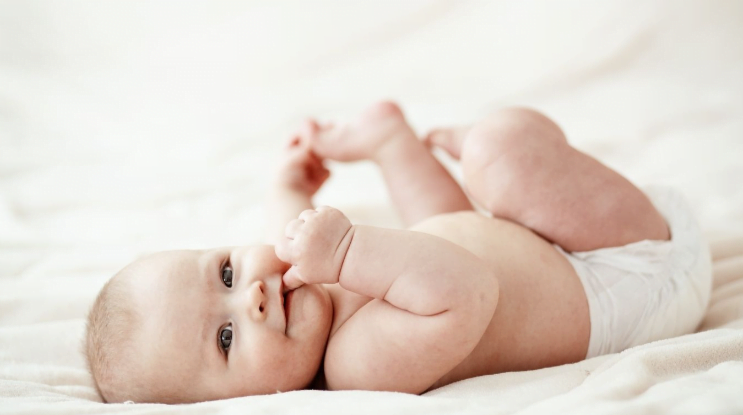Parents should remember that the pace of an infant’s development depends on many factors, such as genes, temperament, family environment, and other individual characteristics. Although the range of developmental norms is wide, it is worth knowing what are the most important skills an infant should acquire. So what does the baby’s development look like in the first weeks?

Physical Development
A one-month-old baby’s neck muscles are not yet fit enough to keep the head upright. The baby can raise its head a little when lying on its tummy, but in an upright position, when carried by an adult, it will not support the head on its own.
A one-month-old baby may try to pick up toys, but hand-eye coordination is not yet sufficient for this. The infant may reach out towards the interesting toy, but it will probably have its fists clenched and will not grab it.
The proper physical development of a baby can also be determined based on the observed unconditional reflexes. During the first month of your baby’s life, you may notice:
- Grasping reflex: occurs when you touch the inside of a child’s hand with a finger or a thin object. The baby has a strong fist on a finger or an object.
- Babinski’s reflex: you can observe it when you tickle the child on the sole. The little toes then bend inwards, while the toe extends upwards.
- Walking reflex: if you hold the infant upright under its armpits and the infant touches the ground with its feet, you can observe it taking steps.
- Moro reflex: noticeable when the baby gets frightened. The baby first stretches the limbs and then pulls them towards it while clenching its fists.
- Rooting reflex: when you touch your baby’s cheek, it turns his head and opens his mouth. This means your baby is ready to eat.
An infant’s blood circulation and keeping body temperature still don’t work as well as in an adult. Therefore, you should pay attention to whether your baby is always dressed according to the temperature. Remember that most heat escapes through the hands and feet.
If you do not breastfeed your baby for some reason, make sure to feed it with the highest-quality baby formula. Consider Holle Cow Pre as an option. It is suitable for newborns from the first days of life.
Mental Development
Although a month-old baby communicates with the world only through sounds, parents can easily spot some signs of its temperament. Some infants are quieter and calmer, while others are impatient and mobile. Already in the first month, you can notice some signs that will give you an idea of your newborn’s nature. Already at the end of the first month, parents may notice that the baby is carefully observing faces and objects. It also begins to smile and even squeak, showing its satisfaction.
How to Boost Your Baby’s Development
During the first month of a baby’s life, long hours of sleep are the most important. It is during sleep that the nervous system develops. However, sleep is not enough for a baby to develop properly — stimuli are needed for that.
The sounds of parents’ voices are critical stimuli. That is why it is often emphasized how important it is to talk to your baby. Parents also support the baby’s development through touch, massaging, and smell. They provide a sense of safety and stimulate nerve endings. The natural rocking and carrying reflex is also important for the baby. It can stimulate a sense of balance, which will pay off in motor coordination development.
Remember that premature babies do not always develop in the same way as term-born ones. In these cases, it is up to the pediatrician to determine if the baby is developing properly. Breakthroughs for such babies usually come on their expected birth date.

